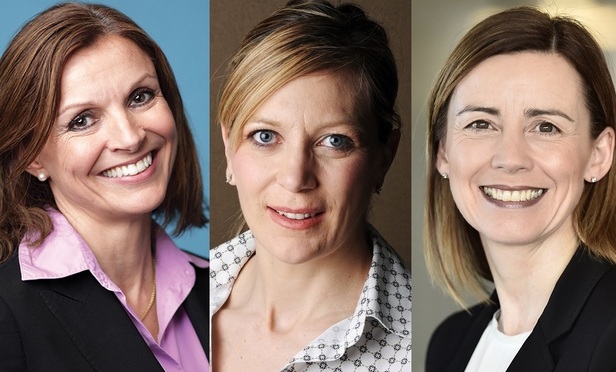'There are enough ambitious men around' - female practice heads on making it to the top
Legal Week talks to female practice leaders at UK top 15 firms about how they achieved success
March 08, 2017 at 05:55 AM
13 minute read
Despite efforts to boost diversity, men still outnumber women more than five to one when it comes to running global practices at the UK's top law firms. Here, Legal Week speaks to some of those who have made it about how they achieved success, the reality of their roles and their advice to the next generation.
Paula Hodges is in a taxi on a freeway in Texas. She has 10 minutes to spare for an interview.
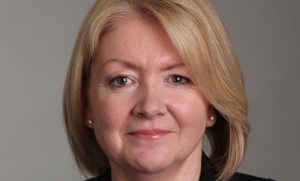 "I'll be in Beijing next week. It does get very tiring at times going from the US to China on consecutive weeks, but would I want it any other way? Would I want to sit in my office in EC2 every day? No. You've got to roll with it."
"I'll be in Beijing next week. It does get very tiring at times going from the US to China on consecutive weeks, but would I want it any other way? Would I want to sit in my office in EC2 every day? No. You've got to roll with it."
Herbert Smith Freehills (HSF) arbitration head Hodges (pictured right), who took silk in 2014, is one of only a small minority of women holding global practice leadership roles across the UK's largest law firms, with the figure tinier still when looking at three core practices: corporate, disputes and finance.
At 14 of the UK's 15 largest law firms that provided data to Legal Week for this feature, only around one in six of the total global practice leader positions available are held by women. This figure falls to just 13% (roughly one in eight) of the total global leader or co-leader positions available in the three core practices areas consistent across all firms.
As such, finding willing interviewees with the time to speak is a challenge. Those who were able to talk however, were generous with their limited time – keen to aid efforts to boost diversity where the number of women in the population as a whole means there could be parity.
Hogan Lovells finance head Sharon Lewis spoke at 5am in Washington after spending the previous day in Las Vegas. Meanwhile, Pinsent Masons risk advisory head Laura Cameron (pictured top, right) picked up the phone after sitting in a two-hour traffic jam in Beijing.
The detail
Comparing practice groups on a like-for-like basis across the UK's top 15 firms is not straightforward, with a practice group at one firm only qualifying as a sub-practice at another. For this reason, we have added up the roles across the key practice areas as defined by each firm.
Being the only female partner among a bunch of French men was a bit tiresome
Regardless of the name and number of practices at each firm, the stats make for depressing reading. Across the group, Hogan Lovells has the highest proportion of female global practice leaders (40%) alongside Slaughter and May (40%), followed by Linklaters on 29%, although it is worth mentioning that Linklaters lists the largest number of practice areas of the group.
Looking at the magic circle, where there is yet to be a female firmwide leader, Freshfields Bruckhaus Deringer named women in 13% of its practice head roles, with Allen & Overy on 8%.
Three firms do not count any female leaders among their listed core practices: Clifford Chance (CC), DLA Piper and Simmons & Simmons. Clyde & Co has been excluded from the feature as the firm declined to provide information on the basis that it is not organised along a practice basis.
Stark as the gender disparity is today, these numbers come after years of efforts to address the lack of female partners and despite the fact that women made up more than half of UK trainee intakes across the firms in both 2015 and 2016.
The reality is that increasing attention has so far not changed the fact that the number of women in law dwindles the higher up the food chain you go. Indeed, the ratio of women as a percentage of the group's total partnership remained static at 20% in both 2015 and 2016.
While the results may not yet be apparent, some firms should be lauded for their efforts to correct the balance at the junior end in the hope of ultimately increasing partner numbers – both Eversheds and Pinsent Masons have reported trainee intakes that were at least 60% female for the past two years.
Male allies
Clearly much of the reason for the lack of female representation at practice head level simply reflects the dearth of women within the partnership as a whole.
This is not the only issue though. Seven women spoke to Legal Week for this article. All are current or former global practice heads. Across the group, a common message emerged: finding a male ally had been crucial to their success, with many only putting themselves forward for their earlier management roles at the suggestion of a male colleague. For those unable to find such an ally, leadership opportunities may never arise.
Kirk said, 'Would you think about taking this role?' I said, 'Don't be ridiculous' but he was very encouraging and thought I was capable of doing it.
Hodges comments: "Charles Plant (the former HSF litigation and arbitration partner who went on to chair the Solicitors Regulation Authority) was very good at putting me forward for things. When you've got someone like that in an important position, it helps."
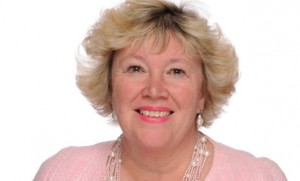 Lewis (pictured right) says: "It is very important to develop relationships with others who you can help and who can help you. The head of finance role became open in 2014 and David Hudd (former finance head and now deputy chief executive of the firm) put me forward for that role."
Lewis (pictured right) says: "It is very important to develop relationships with others who you can help and who can help you. The head of finance role became open in 2014 and David Hudd (former finance head and now deputy chief executive of the firm) put me forward for that role."
She adds: "I never did any of the campaigning. I think several men actively tried to position themselves for the role."
It had also been Hudd who had recruited Lewis and promoted her to partner in Paris, where she became the firm's first ever female partner in 1998.
At Pinsents, Cameron tells a similar story, being encouraged to go for her first management post by the former senior partner of McGrigors before it merged with Pinsents in 2012.
"Kirk Murdoch came to my office one night when I was working late," she recalls. "Our litigation head was about to retire but it had not been in my mindset at all and we had more senior people above me. Kirk said, 'Would you think about taking this role?' I said, 'Don't be ridiculous' but he was very encouraging and thought I was capable of doing it."
In 2008, Freshfields Bruckhaus Deringer employment, pensions and benefits head Caroline Stroud (pictured top, left) won the backing of a senior male partner – the firm's then managing partner Ted Burke – while speaking at a meeting.
He sponsored her to become global HR partner that year, her first job in management and a role she had never anticipated doing. "I had some strong views on what strategic steps we needed to take. I spoke up about these issues and I showed that I really cared about the firm. In retrospect, I think this positioned me for that role and caught his attention."
Stroud is now the only female global practice leader at Freshfields, out of eight roles across the firm.
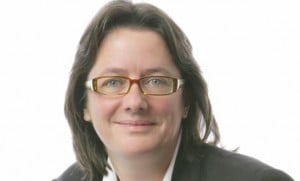 In contrast, Norton Rose Fulbright's EMEA head of dispute resolution and litigation, Deirdre Walker (pictured), put herself forward for the London managing partner role in 2002.
In contrast, Norton Rose Fulbright's EMEA head of dispute resolution and litigation, Deirdre Walker (pictured), put herself forward for the London managing partner role in 2002.
She went on to build a "good working relationship" with longstanding chief executive Peter Martyr. "I think to everyone's surprise, including my own, I was elected [as London head]. We decided as a firm to drop the role and to run the firm along practice lines in 2009, but Peter Martyr asked me to take on the role of global head of disputes."
Regardless of whether they themselves were encouraged to go for a leadership role at the suggestion of a male partner, all of those interviewed believe that without the direct support of male (or female) partners, women are less likely to be able to access senior roles.
Slaughter and May dispute resolution head Deborah Finkler says: "This is something men do naturally for other men. I'm quite conscious of the need to sponsor women in particular."
Practising what she preaches, after four years in her role Finkler is set to make way for another female partner. Sarah Lee, who has been a disputes partner at the firm since 1999, will take up the disputes head position on 1 May.
Stroud adds: "Global practice group leaders have a real opportunity to sponsor women. I would like to see more women in management roles." She says sponsorship can be either formal or informal but it should be "more directive" than mentoring. "A sponsor will choose to assist you in placing you in a role or giving you an opportunity, while a mentor has more of a counselling role."
Balancing acts
Regardless of whether or not they have children, many of those we spoke to highlighted the additional challenges women can face throughout their careers.
Lewis reminisces on being the first female partner in Hogan Lovells' Paris office. "One of the reasons I used to come running back to London so often was that, at times, being the only female partner among a bunch of French men was a bit tiresome."
Today, the firm's Paris office has around 35 partners and about a third of them are women.
I have seen some women flounder a bit because they haven't found anyone to gravitate towards
Walker shares a more recent tale: "I was in a hearing where the counsel for the other side were all male, whereas on our side we were predominately female. In the cross-examination the male QC started talking about the wife hitting the curb and damaging the tires. The dispute is about tyres and whether they were of poor quality, and he was trying to contextualise his questions by reference to the wife's poor driving. I thought it was very badly done."
And as Ashurst finance head Helen Burton (pictured top, centre) comments, at one end of the scale the gender bias that exists is hurting women's careers. She says: "I have seen some women flounder a bit because they haven't found anyone to gravitate towards. [City banking partner] Mark Vickers has acted as my sponsor at Ashurst and it's been very useful in terms of support."
Add in the complications of children or other caring expectations and 'juggling' and 'balancing' are referenced a lot.
"I am a mother, a single parent, and I do think that the position remains that women take greater responsibility for the care of children or for their parents," says Walker. "I haven't had to work harder than any man but I have a broader range of responsibilities."
Burton adds: "In your career's formative years when you need to be creating relationships at work, women are often having to balance that against childcare responsibilities. Until the burden of that falls fairly across both parents, it will impact more negatively on women."
Despite these obstacles, any woman interested in a leadership role should make it obvious to her managers and peers early on and try to get involved in as many wider initiatives at the firm as possible.
Burton explains: "There are things you need to demonstrate – a lot of people are very good lawyers but it's about being interested in making the firm a better place. I was instrumental in setting up the firm's first diversity committee and then I became graduate recruitment partner. Roles like that mean you get exposure to management and talk to lots of people."
Stroud adds: "I think if you start taking opportunities to lead early on, such as a project or office initiative, it builds your confidence. I started off as a junior lawyer feeling rather nervous about presenting. I also have a natural inclination to see what other people say first, but I have had to learn to overcome that."
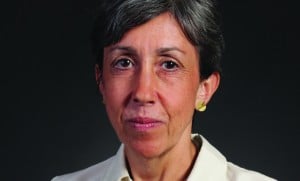 "There are enough ambitious men around," says Finkler (pictured right). "Women who are interested in taking any kind of leadership role need to make it clear that that is what they want to do. They need to push themselves forward."
"There are enough ambitious men around," says Finkler (pictured right). "Women who are interested in taking any kind of leadership role need to make it clear that that is what they want to do. They need to push themselves forward."
Perhaps highlighting the obstacles that still remain before gender parity is achieved, more than half of the women we spoke to for this feature would rule out a run for firm-wide management at their firms.
They feel that they have already gone far enough. "I do not anticipate going further," says Walker. "It does not appeal to me. I do more than enough travelling as it is. The roles that [EMEA managing partner] Martin Scott, Peter Martyr and [chair] Stephen Parish do involve significant amounts of travelling."
Finkler adds: "I actually like doing the work. I am happy to do outward-facing bits for the disputes group, but I wouldn't want to have to do what the senior partner does."
The three that didn't rule out such a play are Hodges, Stroud (who already had a run as a contender in Freshfields' most recent management election campaign) and Burton.
Back in her taxi in Texas, Hodges is more circumspect: "I have got the role I want as a practice area leader: I have built a team of global arbitration lawyers around the world. But I might have one or two more roles in me."
To coincide with International Women's Day, Legal Week is publishing a series of interviews and profiles with high profile female law firm leaders and partners. For more, see:
- Hogan Lovells diversity chair Ruth Grant on role models, bias and the best and worst parts of leadership
- Making female law firm leaders 'normal' – Reed Smith's Tamara Box on the impact of role models
- 'I was the only female in an intake of 100 trainees' – CMS UK's Penelope Warne on why City culture needs to change
- 'The days of a one-track path to partnership are over' – BLP's Lisa Mayhew on why women should not rush into career decisions
This content has been archived. It is available through our partners, LexisNexis® and Bloomberg Law.
To view this content, please continue to their sites.
Not a Lexis Subscriber?
Subscribe Now
Not a Bloomberg Law Subscriber?
Subscribe Now
NOT FOR REPRINT
© 2025 ALM Global, LLC, All Rights Reserved. Request academic re-use from www.copyright.com. All other uses, submit a request to [email protected]. For more information visit Asset & Logo Licensing.
You Might Like
View All
DeepSeek and the AI Revolution: Why One Legal Tech Expert Is Hitting Pause
4 minute read
What Happens When a Lateral Partner's Guaranteed Compensation Ends?

Lawyers React To India’s 2025 Budget, Welcome Investment And Tax Reform

Russia’s Legal Sector Is Changing as Western Sanctions Take Their Toll
5 minute readTrending Stories
- 1Federal Laws Also Preempt State's Swipe Fee Law on Out-of-State Banks, Judge Rules
- 2Judge Grills DOJ on Trump’s Birthright Citizenship Executive Order
- 3Exceptional Growth Becoming the Rule? Demand and Rate Hikes Drove Strong Year for Big Law
- 4Dentons Taps D.C. Capital Markets Attorney for New US Managing Partner
- 5Auto Dealers Ask Court to Pump the Brakes on Scout Motors’ Florida Sales
Who Got The Work
J. Brugh Lower of Gibbons has entered an appearance for industrial equipment supplier Devco Corporation in a pending trademark infringement lawsuit. The suit, accusing the defendant of selling knock-off Graco products, was filed Dec. 18 in New Jersey District Court by Rivkin Radler on behalf of Graco Inc. and Graco Minnesota. The case, assigned to U.S. District Judge Zahid N. Quraishi, is 3:24-cv-11294, Graco Inc. et al v. Devco Corporation.
Who Got The Work
Rebecca Maller-Stein and Kent A. Yalowitz of Arnold & Porter Kaye Scholer have entered their appearances for Hanaco Venture Capital and its executives, Lior Prosor and David Frankel, in a pending securities lawsuit. The action, filed on Dec. 24 in New York Southern District Court by Zell, Aron & Co. on behalf of Goldeneye Advisors, accuses the defendants of negligently and fraudulently managing the plaintiff's $1 million investment. The case, assigned to U.S. District Judge Vernon S. Broderick, is 1:24-cv-09918, Goldeneye Advisors, LLC v. Hanaco Venture Capital, Ltd. et al.
Who Got The Work
Attorneys from A&O Shearman has stepped in as defense counsel for Toronto-Dominion Bank and other defendants in a pending securities class action. The suit, filed Dec. 11 in New York Southern District Court by Bleichmar Fonti & Auld, accuses the defendants of concealing the bank's 'pervasive' deficiencies in regards to its compliance with the Bank Secrecy Act and the quality of its anti-money laundering controls. The case, assigned to U.S. District Judge Arun Subramanian, is 1:24-cv-09445, Gonzalez v. The Toronto-Dominion Bank et al.
Who Got The Work
Crown Castle International, a Pennsylvania company providing shared communications infrastructure, has turned to Luke D. Wolf of Gordon Rees Scully Mansukhani to fend off a pending breach-of-contract lawsuit. The court action, filed Nov. 25 in Michigan Eastern District Court by Hooper Hathaway PC on behalf of The Town Residences LLC, accuses Crown Castle of failing to transfer approximately $30,000 in utility payments from T-Mobile in breach of a roof-top lease and assignment agreement. The case, assigned to U.S. District Judge Susan K. Declercq, is 2:24-cv-13131, The Town Residences LLC v. T-Mobile US, Inc. et al.
Who Got The Work
Wilfred P. Coronato and Daniel M. Schwartz of McCarter & English have stepped in as defense counsel to Electrolux Home Products Inc. in a pending product liability lawsuit. The court action, filed Nov. 26 in New York Eastern District Court by Poulos Lopiccolo PC and Nagel Rice LLP on behalf of David Stern, alleges that the defendant's refrigerators’ drawers and shelving repeatedly break and fall apart within months after purchase. The case, assigned to U.S. District Judge Joan M. Azrack, is 2:24-cv-08204, Stern v. Electrolux Home Products, Inc.
Featured Firms
Law Offices of Gary Martin Hays & Associates, P.C.
(470) 294-1674
Law Offices of Mark E. Salomone
(857) 444-6468
Smith & Hassler
(713) 739-1250





